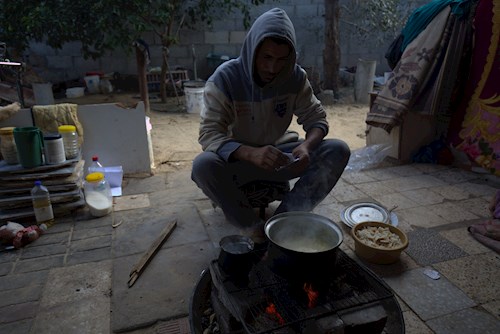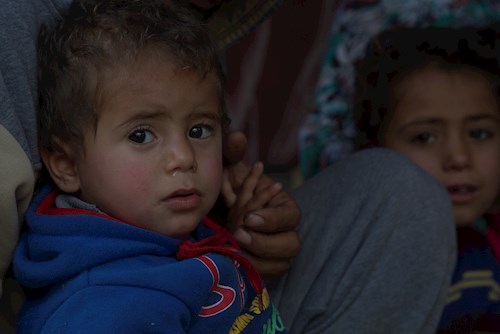Mahrous Khalil Zu’rob, his wife Nasreen and his five sons live in a slum in Gaza, Palestine. Their tiny, dilapidated house is situated beside a landfill of pungent refuse, where the family scavenges for scraps of wood that they can burn as fuel.
Mahrous Khalil doesn’t have a job and without a stable source of income for the family, they cannot buy basic essentials like food, medicine or gas for cooking.
Nasreen says: “We suffer a lot during the winter. It’s a season of suffering. When it rains, we don’t feel safe inside our house because it’s so rickety and doesn’t protect us from the elements. Many times, I’ve been forced to leave with my children and stay with relatives until the house was dry again.”
Nasreen’s children suffer from many diseases due to the cold and lack of heating in their home. If she can find firewood, she lights a fire even though the smoke from it is dangerous to her son Walid, who is suffering from a chest problem. Nasreen has no way to buy a heater so lighting a fire is the only way she can keep her family from freezing.

For the past three months, they haven’t been able to buy cooking gas. Walid desperately needs treatment for his chest complication but Nasreen can’t take him to the doctors because she doesn’t have enough money for an appointment.
In Gaza, vulnerable families are still suffering from the long-term effects of the 2014 conflict. Violence affected more than 142,000 homes, completely destroying 9,117 of them and leading to a shocking homelessness crisis in Gaza. At its peak, almost 500,000 people had been displaced. Around 75,000 are currently homeless.
In December 2017, UNOCHA identified 60 communities in low-lying locations across Gaza as being vulnerable to flooding, even after light rainfall. More than 560,000 people may be affected, as well as 15 primary health centres and 65,000 students and school teachers.
Infrastructure in Gaza hasn’t been repaired or upgraded over the last ten years, despite sustaining damage in the recurrent hostilities. Rapid population growth has also placed additional pressure on housing, medical centres, WASH facilities and food supplies.

In Palestine, almost a quarter of the population – 1.3 million people – can’t afford nutritious food. Food insecurity is an even bigger issue for women, as 39% of female-headed households in the Gaza Strip go to bed hungry every day.
With the support of our generous donors, we were able to provide the Mahrous Khalil, his wife and five young children with blankets, warm clothes and an electric heater to protect them from the winter cold.
In 2017, we provided safe, clean water to more than 200,000 innocent Palestinian children every day of the year. Thanks to your donations, we also built a welfare centre in Jerusalem for 2,580 vulnerable orphans. Our brand new centre provides a daycare, kindergarten and primary school, plus a fully-equipped kitchen and dining hall. With your donations, we’ve created a safe and comfortable environment for vulnerable children, where they can access ongoing care.
Vulnerable families in Gaza suffer throughout the year. However, in the winter months, their lives become unbearable. Wind, rain and freezing temperatures invade their damaged homes, creeping in through holes in the walls or ceilings. Some families are forced to live in makeshift shacks or thin nylon tents with little protection from the elements.
Young children are particularly susceptible to colds and flu in the cold weather, illnesses that can be fatal if little ones are malnourished or they stay warm and dry.
For just £65, you can provide a family like Mahrous Khalil’s with enough nutritious food to keep them well-fed for a whole month. £165 will give a needy family the winter clothes, blankets, food and heating fuel they need to stay warm, fed and dry in the bitter weather. £210 will provide shelter to protect a vulnerable family with young children from the rain, wind and snow.
Together, we can stop winter killing today.